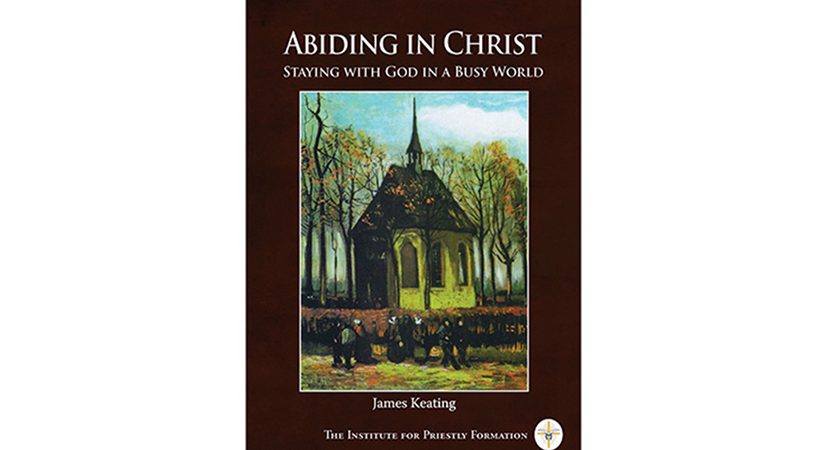Tips to Stay Close to God
Deacon Keating’s book teaches us how to weave prayer into the day
Deacon Harold Burke-Sivers Comments Off on Tips to Stay Close to God
Two weeks after I was ordained a deacon, we welcomed twins into our family. My wife and I were now raising a 4-year-old, a 2-year-old and newborn twins. To call this time in our lives “demanding” is an understatement. Connecting with God through prayer in a deep and meaningful way every day while maintaining the intricate and vitally important balance between work and family was almost overwhelming. I wish Deacon James Keating’s booklet was available back then!
All of us, at some point, struggle to fit God into our day. In our daily routines’ busyness and the challenges that come with work and diaconal ministry, our hearts yearn for a simpler life. “Abiding in Christ: Staying with God in a Busy World” (Institute of Priestly Formation, $5) delves into the complexity of life and teaches us how to stay close to God amidst the frenzy of human experience.
Deacon Keating shows how we can achieve a rich spiritual life through the transformative power of prayer, which is “fundamental, substantial, and fulfilling to our very humanity” and ”defines our very lives” (page 2). The key lies in weaving the threads of prayer into the intricate fabric of our day. Thus the spiritual life — that is, living a life of holiness, prayer and moral living — becomes “not an achievement but a gift.”
Part of the anxiety of finding space for prayer comes from busyness, but also from our frustrations. Deacon Keating acknowledges this fact and insightfully shows that “the very frustrated desires you notice in yourself are what Christ wants to fulfill in you more than you can even imagine!” This is because true human happiness flows from spiritual joy. Spiritual joy does not mean you are always going to be “happy” since spiritual joy involves suffering; it is the suffering of “letting go” to achieve interior peace.
“Abiding in Christ” also explores renunciation, celebration and hearing God as means of achieving divine intimacy or divinization (cf. 1 Jn 4:16 and 2 Pt 1:4). Deacon Keating explains that intimacy with the Lord comes from renouncing sin, and the more we turn to the Lord in our sin, the more we place ourselves in the presence of his love, and the more our affection for sin will subside.
We “celebrate” when the “space formerly occupied by sinful interests becomes filled with joy and gratitude.” It is in celebrating that we create habits of love that are interspersed throughout our daily routines as the obligations and responsibilities of work, family and ministry vie for our time and attention.
Like a rich sauce that brings disparate elements of a meal into one cohesive dish, listening to God’s voice in silence unites divinization and celebration together into one harmonious song of praise. Taking time every day to intentionally make room for silence is critical. Since I often describe myself as “addicted” to Adoration, this is my favorite section of the book, where Deacon Keating provides an extraordinarily keen insight that has given me much food for thought: “Silence is not the absence of words but the fullness of presence, a presence ordered toward gift.”
Deacon Keating ends this short book with five practical ways to remain with God: vocation, prayer time, creative expression, service to others and communal worship.
“Abiding in Christ” is certainly the fruit of thoughtful and profound contemplation, reflection and prayer. Deacon Keating offers the reader prudent wisdom and sage spiritual guidance to help us navigate the sometimes turbulent waters of a busy and active life.
DEACON HAROLD BURKE-SIVERS is the author of “Our Life of Service: The Handbook for Catholic Deacons” (Ave Maria, $17.95).





